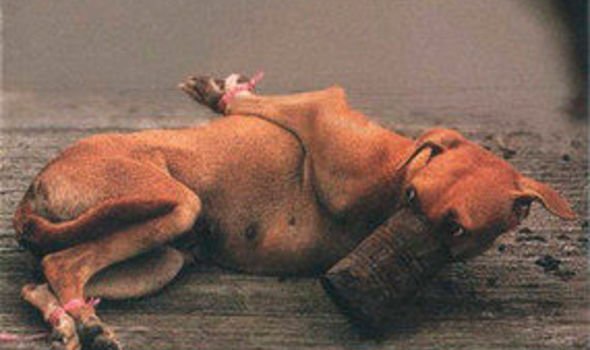-------- Original Message --------
| Subject: | FW: SICKENING & SAD NEWS: Dogs for Dinner |
|---|---|
| Date: | Tue, 5 Jul 2011 10:52:45 -0700 |
| From: | Robin Cook <rcook@21goldchoice.com> |
| Reply-To: | <rcook@21goldchoice.com> |
From: Grannie's Mail [mailto:granniefox@gmail.com]
Sent: Monday, July 04, 2011 11:32 PM
To: undisclosed-recipients:
Subject: SICKENING & SAD NEWS: Dogs for Dinner
Is there an organization that will stop this torture?
________________________________________________________________
http://www.express.co.uk/posts/view/256492/Dogs-for-dinner
| DOGS FOR DINNER Express.co.uk Half a million dogs a year die agonising deaths to satisfy the illegal market for their flesh despite the efforts of animal welfare campaigners and ... |
DOGS FOR DINNER

The dogs are muzzled with rusty tin cans
Sunday July 3,2011
By Geraint Jones and Stuart Winter
MUZZLED and caged, their eyes full of terror, these dogs are some of the lucky few, rescued from the brutal trade in dog meat that is becoming increasingly widespread in the Philippines.
Half a million dogs a year die agonising deaths to satisfy the illegal market for their flesh despite the efforts of animal welfare campaigners and government legislation outlawing the racket.
The dogs, many of them family pets, are snatched off the streets, their front legs trussed behind their backs and muzzled with rusty tin cans. They are packed in cages and driven hundreds of miles in vans in stifling heat to crude slaughter- houses where their throats are cut.
They end up in markets where they are sold to the public or in a growing number of restaurants with dog meat on their menus.
British-based charity Network For Animals says although the trade was outlawed in 1998, government inaction and police corruption have allowed it to expand.
Teams from the charity, acting in partnership with informants and officials, risk their lives to intercept vans on the way to slaughterhouses. They find the dogs in appalling conditions. The temperature inside the vans can reach 100F and many of the animals do not survive even after being rescued. For those that do, the charity works with the authorities to help them recover and be rehomed.
 Half a million dogs a year die agonising deaths to satisfy the illegal market for their flesh  |
It also funds local publicity campaigns highlighting the cruelty of the trade and the threat to people from the spread of rabies. Its 12-year campaign has led to the rescue of more than 3,000 dogs, the conviction of 86 dog meat traders, and the closure of 26 slaughterhouses, but it warns much more needs to be done.
Tory MP Mark Pritchard, chairman of the All Party Parliamentary Group for the Philippines, has raised the issue with Filipino authorities including the mayor of the capital city Manilla and now plans to lobby President Benigno Aquino.
He said: “This activity does a huge amount of damage to the Philippines’ international reputation and I will be raising this issue with the president who must take action.
“Such pictures can have an influence on British tourists’ decision to visit the Philippines which will impact on their economy. The authorities and police must act over this issue if the Philippines’ international reputation is to be safeguarded.” Eating dog meat is a long-standing northern Philippines tradition, connected with celebrations and rituals of mourning.
Historically, this accounted for a relatively small number of animals but over the past 25 years dog-eating has grown rapidly for commercial rather than cultural reasons.
It was banned nationwide in 1998, but though traders now face jail the trade continues to flourish.
A Network For Animals spokesman said: “Trussed dogs are crammed into wire or bamboo cages so tightly they are unable to move. The lucky ones forced against the bars of the cage manage to get some fresh air in the stifling heat. The dogs in the middle often suffocate or die of heat stroke.
“Conditions are so bad that 40 to 50 per cent die before they reach their destination. The dead animals are processed along with live ones for the markets and restaurants and are still profitable.
“Dogs are slaughtered in makeshift slaughterhouses, by being clubbed or having their throats cut while conscious.”
Britain is one of the largest foreign investors in the Philippines and provides extensive aid as well as working with the Philippine government on human rights and other issues. Bilateral trade is worth about £1.6billion a year.
THE charity Network For Animals has compiled an online petition which can be signed on its website, networkforanimals.org.
It is also asking people to contact the Philippines authorities in Britain to urge their government to enforce the law that already prohibits the trade in dog meat.
Anyone wishing to do so should write to: Philippines Embassy, 6-8 Suffolk Street, London SW1Y 4HG. Tel: 020 7451 1800. Email: embassy@philemb.co.uk




0 comments:
Post a Comment